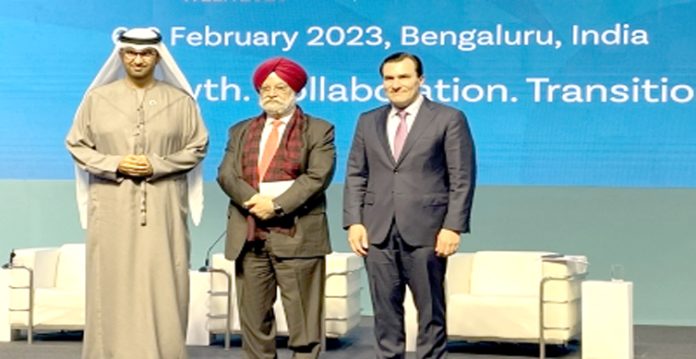President-designate for COP28 UAE Sultan Al Jaber on Tuesday made the case for a pro-growth, pro-climate agenda to support an inclusive energy transition that leaves no one behind.
Speaking at the India Energy Week in Bengaluru at the Asian Ministerial Energy Roundtable, Jaber noted that the world’s fastest-growing major economy was dealing with the central question of how to embed sustainable, environment-friendly growth into its development model.
“As India’s economy surges, it is dealing with the fundamental question that the whole world faces. How to adopt policies that are pro-growth and pro-climate at the same time. How to provide for a world that will consume 30 percent more energy by 2050, while protecting our planet. In short, how to hold back emissions, not progress,” Jabar, who is the CEO of Abu Dhabi National Oil Company, noted.
Also Read: Indian Pharma Industry Likely to Grow to $130 bn by 2030
The president-designate noted the significant rise in investment in renewable energy in recent years and India’s drive to add 500 GW of clean energy by 2030, adding that the UAE was keen to partner with India and the world on advancing clean energies.
“Last year, despite an ongoing war, fears of recession and a world still recovering from Covid, annual global investment in clean energy exceeded $1 trillion for the first time. And the trajectory is only going up. Most of this new growth will be driven by the dynamic economies of Asia. Here in India, you are aiming for 500 GW of clean energy by 2030. This is very ambitious, but also very achievable.
And the UAE is ready, willing, and able to partner with you. We have spent the last two decades diversifying our energy portfolio. We’ve invested in nuclear, we are investing in hydrogen and we are expanding our global renewable energy footprint to at least 100 GW by 2030. And we need everyone on this journey with us so that together we can triple global renewable energy capacity over the next seven years.”
Jaber reiterated that policies should take into account the fact that too many people, particularly across the global south still have no or very limited access to energy.
“Their needs must be met as we transition to a new energy system and accelerate progress on all aspects of the climate agenda,” he noted.
Earlier, while delivering the inaugural address at the roundtable, petroleum minister Hardeep Puri said that the Asian economy has grown at the average rate of 5.5 percent over the preceding two decades and registered growth of 6.5 percent posted in 2021, while it is expected to moderate to 4 percent in 2022 amid an uncertain global environment and rise to 4.3 percent in 2023.
“On one hand, advanced economies committed over 500 billion in funds to support and shield consumers and secure alternative fuel supplies by temporarily reverting to nuclear and higher carbon intensity (coal, oil) to fill the energy supply gap, some economies have continued to exacerbate fuel poverty and food insecurity,” the minister said.
“Going forward as the challenges are likely to only become more acute, the value of preparedness against such potential shock is going to start an era of building resilience,” he added.
(This story has been sourced from a third-party syndicated feed, agencies. Raavi Media accepts no responsibility or liability for the dependability, trustworthiness, reliability, and data of the text. Raavi Media managementythisnews.com reserves the sole right to alter, delete or remove (without notice) the content at its absolute discretion for any reason whatsoever.)







